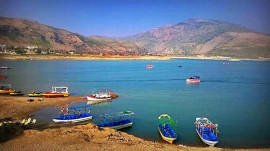
Following the launch of its counter-wide campaign against book pirates in December 2011, the OUP has conducted several raids in collaboration with the Intellectual Property Organisation (IPO) aiming to clamp down on piracy in the country.
“Laws against piracy are weak. The enforcement of these laws is weaker,” Ameena Saiyid, the OUP managing director, told The Express Tribune after the release of the statement.
Saiyid said it was unfortunate that the laws in Pakistan mandated weak punishments for piracy. “If a culprit is apprehended in India, the minimum punishment is a fine of Rs50,000. In Pakistan, the culprits are fined of Rs200,” she said. “How is this supposed to discourage piracy?”
She said 100,000 pirated books had been confiscated so far in the OUP-IPO raids in the country. Piracy was most active in Lahore, she added.
“We are pursuing the matter legally by registering FIRs against the offenders,” said told The Tribune, adding that the Federal Investigation Agency and police were supporting the campaign.
Saiyid said according to the law, the penalty for piracy increased every time the same publisher or individual was caught. It started with a small fine, leading up to bigger fines and imprisonment. “We need to enforce laws because they are the only effective deterrent against piracy”, she said.
She said though Pakistan had signed the Intellectual Property Rights Protocol, which required countries to set minimum standards for the protection of intellectual property, this law was not implemented effectively.
Mohammad Shoaib, manager of Sang-e-Meel Publications, said piracy could only be controlled by mobilising the government institutions concerned.
“We need relevant departments on our side to curb piracy,” he said, adding that monitoring could only be ensured by a central authority. Shoaib said that the increase in prices of book was the main reason that encouraged piracy and the people to buy pirated books. However, Saiyid said that many pirated books were being sold at the same price as the originals. She said that book publishers needed to invest heavily to produce good books. Piracy also deprived authors of royalty payments, and the losses they were suffering due to piracy were restricting their ability to do so, she said.
According to Saiyid’s estimate, the government suffered a Rs20 billion loss in sales tax per year due to piracy of intellectual property in various forms. The campaign will continue till March 2012, though Saiyid added, “We are committed. We will continue as long as it takes to wipe out piracy from the country.
Published in The Express Tribune, January 6th, 2012.
COMMENTS (10)
Comments are moderated and generally will be posted if they are on-topic and not abusive.
For more information, please see our Comments FAQ




1732883922-0/diddy-(48)1732883922-0-165x106.webp)





1732012115-0/Untitled-design-(14)1732012115-0-270x192.webp)






yeah, sure. go ahead. remove the easily and cheaply available books from the market so that your corporate giants can snatch away education too. Bring the prices down, and the public will stop buying pirated books. as simple as that.
they dont want people to study at all. On one hand they are increasing the prices of original books, on the other hand they are stopping pirated ones. where poor people should go?????? they should quit schools and colleges and sit at home......
@kureshi: What don't you understand about the word "copy rights" and property rights? The book is the property of the author and the original publishing company. You just can't steal someone else's property.
As for making books affordable, there are other legal ways to to do it. For example, all major American engineering and technical books are licensed by the publishers to be re-printed at cheaper prices for third world countries.
I got pirated book A study of history of ArnoldToynbee 2vols. abridged version in Islamabad at a cost of Rs. 2495/-, we can hardly afford pirated book, how can we buy much more costly original books? Reduce the prices; nobody will go for pirated ones. Due devalution a book published in india by OUP of Rs. 500 casts to we Pakistanis more than Rs.1000. Why OUP dont publishes books in Pakistan, to save us from paying more than double price of an Indian book?
Atleast they're pirating books this time and not cheap DVD of " you know what"
@Cautious: India itself is a hub of piracy. Pot calling the kettle black?
Another top spot for Pakistan -- too bad it's being a thief. Take some pride in yourselves and stop this practice.